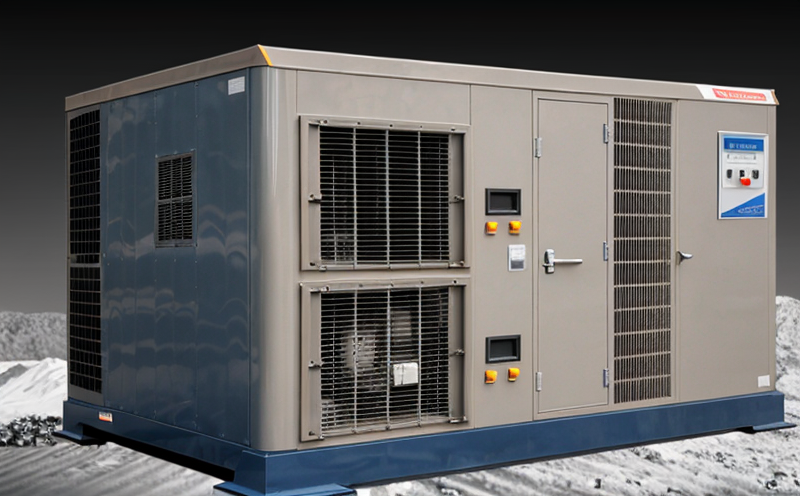ASTM D7426 Dynamic Mechanical Thermal Analysis Testing
The ASTM D7426 Dynamic Mechanical Thermal Analysis (DMTA) testing service is a critical tool in the semiconductor and microchip manufacturing industry, designed to evaluate the temperature-dependent mechanical properties of materials. This test provides unique insights into how materials behave under varying thermal stress conditions, which is essential for ensuring that electronic components are robust enough to withstand real-world operating environments.
DMTA testing involves subjecting a material specimen to alternating sinusoidal strain and measuring its corresponding stress as a function of temperature and frequency. The test setup includes a heating or cooling system capable of precise temperature control, a mechanical displacement mechanism that applies controlled strain, and sensors to measure both the applied load and the resulting deformation.
The primary objective of ASTM D7426 testing is to identify the glass transition temperature (Tg), modulus at Tg, and other critical parameters that define a material's thermal stability. These properties are crucial for assessing whether a semiconductor or microchip will perform reliably under expected operating conditions without failing prematurely.
Specimen preparation is meticulous in DMTA testing to ensure accurate results. Specimens must be cut into rectangular shapes with dimensions specific to the test requirements, typically 10 mm x 25 mm, and polished to minimize surface irregularities that could affect measurement accuracy. The specimens are then mounted onto a fixture compatible with the testing machine.
The DMTA process begins by heating or cooling the specimen at a controlled rate while simultaneously applying a small amplitude oscillatory strain. As the temperature changes, the machine records the resulting stress-strain data, which is used to calculate various mechanical properties such as storage modulus (E'), loss tangent (tan δ), and phase angle.
The test results are reported in graphical format, typically showing the relationship between the applied frequency and the mechanical properties of the material. This data helps engineers understand how the specimen's behavior changes with temperature, providing valuable information for optimizing product design and ensuring reliability.
ASTM D7426 testing is widely recognized within the semiconductor industry as a standard method for evaluating materials used in microchip manufacturing. Its ability to simulate real-world conditions makes it an indispensable tool for quality assurance and research and development processes.
Industry Applications
- Semiconductor Manufacturing: Ensures that materials used in the fabrication of microchips are suitable for the temperature ranges they will encounter during operation.
- Material Science Research: Provides data on how different materials respond to thermal stress, aiding in the development of new and improved semiconductor components.
- Quality Assurance: Detects potential issues early in the manufacturing process by identifying materials that may fail under specified temperature conditions.
- R&D & Innovation: Supports continuous improvement efforts by offering insights into material performance across a range of temperatures and frequencies.
International Acceptance and Recognition
The ASTM D7426 Dynamic Mechanical Thermal Analysis testing method is internationally recognized for its reliability and accuracy in evaluating materials' thermal mechanical properties. It is widely adopted by leading semiconductor manufacturers, research institutions, and regulatory bodies around the world.
This standard has been endorsed by various international organizations, including ASTM International, ISO, and other standards bodies that focus on material science and electronics manufacturing. The widespread acceptance of this testing method ensures consistency in results across different laboratories and industries.
The global recognition of ASTM D7426 testing contributes to the quality assurance processes of many companies operating in diverse regions. By adhering to internationally recognized standards, manufacturers can ensure their products meet stringent performance requirements and are capable of withstanding a wide range of operational conditions.
Environmental and Sustainability Contributions
The ASTM D7426 Dynamic Mechanical Thermal Analysis testing method plays a vital role in promoting sustainability within the semiconductor industry. By ensuring that materials used in microchip manufacturing are robust enough to withstand environmental stresses, this test helps reduce waste and increase the lifespan of electronic devices.
Through accurate material selection based on DMTA results, manufacturers can design products that operate efficiently and reliably under various temperature conditions. This not only enhances product performance but also contributes to energy efficiency by minimizing power consumption and heat generation in end-user applications.
The focus on sustainability extends beyond just the manufacturing process; it also encompasses the lifecycle of electronic devices. By using materials that are less prone to failure, manufacturers can extend the useful life of their products, thereby reducing electronic waste and promoting a circular economy.





